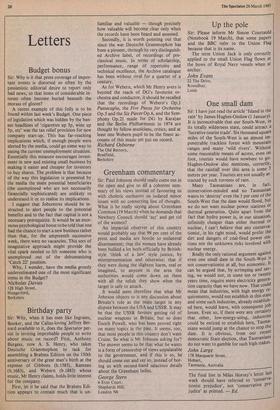Birthday party
Sir: Why, when it has men like Ingrams, Booker, and the Callas-loving' Jeffrey Ber- nard available to it, does the Spectator per- sist in inviting improbable people to write about music on record? First, Anthony Burgess, now A. S. Henry, who takes Deutsche Grammophon to task for assembling a Brahms Edition on the 150th anniversary of the great man's birth at the expense of Gibbons (b.1583), Rameau (b.1683), and Webern (b.1883) whose music, Mr Henry claims, holds little interest for the company.
First, let it be said that the Brahms Edi- tion appears to contain much that is un- familiar and valuable — though precisely how valuable will become clear only when the records have been heard and assessed.
Secondly, it is worth pointing out that since the war Deutsche Grammophon has been a pioneer, through its very distinguish- ed Archive label, of recordings of pre- classical music. In terms of scholarship, performance, range of repertoire and technical excellence, the Archive catalogue has been without rival for a quarter of a century.
As for Webern, which Mr Henry avers is beyond the reach of DG's favourite or- chestra and conductor, it should be recalled that the recordings of Webern's Op.1 Passacaglia, the Five Pieces for Orchestra Op.5 and the Six Pieces Op.6, and the Sym- phony Op.21 made for DG by Karajan and the Berlin Philharmonic in 1974 are thought by fellow musicians, critics, and at least one Webern pupil to be the finest ac- counts of this music yet put on record. Richard Osborne
The Old Rectory, Bradfield, Berkshire














































 Previous page
Previous page